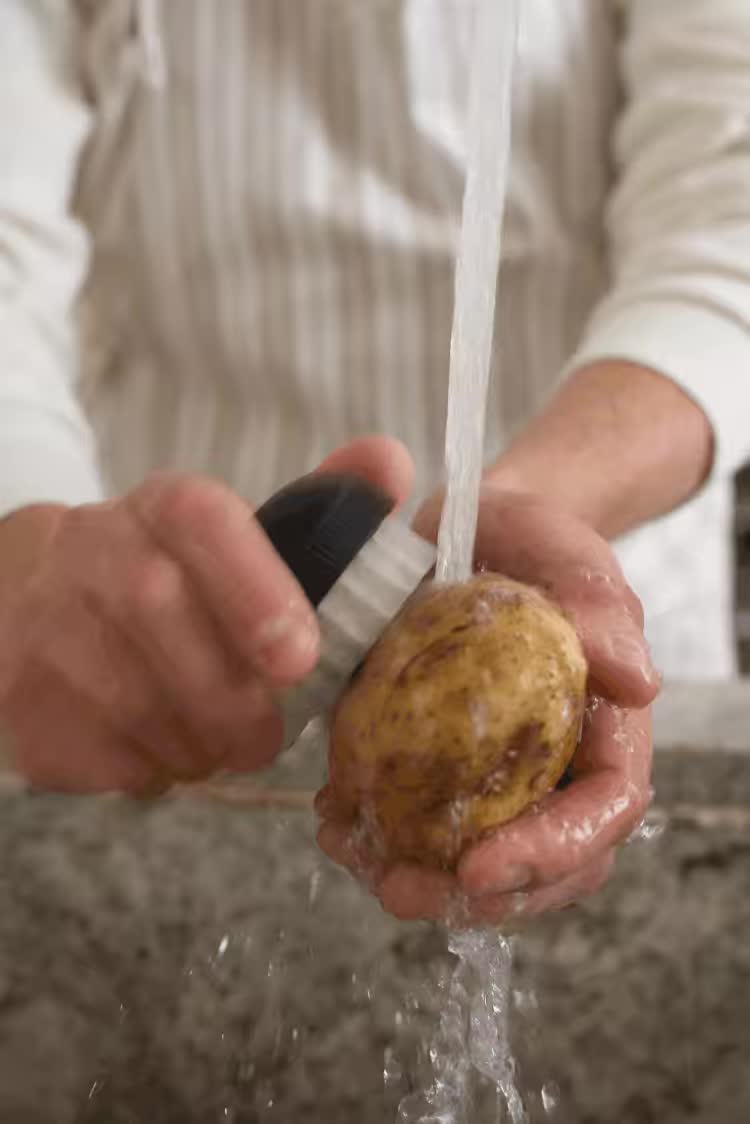How to Wash Potatoes to Actually Get Them Clean, According to Our Test Kitchen

Since we can do everything from bake and twice bake to roast, fry, grill, hasselback, hash, smash, and salad-ify spuds, we almost always have a big bag of potatoes on hand. We celebrate and savor them often in recipes ranging from timeless casseroles to trending Million-Layer Potatoes, and it’s clear that we’re not alone. The average American eats 124 pounds of potatoes each year, according to Idaho Potato.
To help you stock up wisely, we’ve already covered how to choose and store potatoes and recently shared the easiest way to remove the skin from a boiled potato without a peeler. And today, we’re going back to basics and explaining how to wash potatoes.
Sure, this concept sounds like common sense, but when you take a moment to consider all of the potential questions that could pop up along the way, a guide for how to wash potatoes starts to make so much sense. Should you rinse immediately after bringing potatoes home, as we advise with bananas? Can any tools make the task easier? Is it wise to wash after boiling?
We tapped the Test Kitchen to answer all of those questions and explain the ultimate way to wash your spuds to get them clean and recipe-ready.
Sarah Brekke, M.S., Better Homes & Gardens Test Kitchen brand manager
Do You Really Need to Wash Potatoes?
Potatoes are root vegetables that grow in soil underground. Even after picking, potatoes almost always carry around some dirt and debris that may have some pesticides or bacteria in the mix.
To help remove any potentially unsafe-to-consume elements, it’s important to clean your potatoes—yes, even if you plan on peeling them or don’t plan to eat the skin. A dirty potato skin can transfer contaminants to the parts of the dish you do plan to eat, which poses a food safety risk.
How to Wash Potatoes
Besides a sink, your spuds, and a knife to remove any bruises, growths, or blemishes, the only other essential tool you’ll need to wash potatoes is a vegetable brush.
“A brush is a must-have to ensure the entire surface gets effectively cleaned, especially in irregular areas like the eyes of potatoes,” explains Sarah Brekke, M.S., Better Homes & Gardens Test Kitchen brand manager.
Once you’ve got that one essential kitchen tool, you’re ready to master how to wash potatoes the Test Kitchen way:
- Fill a bowl or clean sink basin with cool water.
- Place potatoes in the water, and let them soak for 15 minutes to allow dirt and grime to loosen.
- Using a vegetable brush, thoroughly scrub the potatoes to remove dirt from the skins.
- Use a knife to trim away any blemishes or eyes from the potatoes.
- If desired or recommended for the dish you’re creating, use a vegetable peeler to remove the skin.
- Using a paper towel or clean kitchen towel, pat the exterior of the potatoes dry and proceed with your potato recipe.
You’ve now conquered how to wash potatoes before starting your recipe. It’s wise to keep in mind that washing might come in handy later on as part of your potato prep.
“Depending on the recipe, it can be helpful at certain times to rinse your chopped potatoes to remove any excess starch that’s on the exterior of the pieces,” Brekke says.
For instance, rinsing potatoes under cool water before boiling can help avert the gummy exterior texture that can result after cooking, especially with Russet potatoes. (“Try this trick the next time you make potato salad,” Brekke recommends.) Likewise, rinsing after cooking can help to wash away excess starch and any potential gumminess so that your mashed potatoes are lighter and fluffier.
1 Trick to Make Washing Small Potatoes Easier
These instructions for how to wash potatoes work well for large potatoes and sweet potatoes, however, it can be a hassle to wash and scrub dozens of small new potatoes or fingerlings. For these kinds of petite potatoes, Brekke advocates for a vinegar soak.
- Fill a bowl or clean sink basin with 3 parts cool water and 1 part distilled white vinegar.
- Place the small potatoes in the water, and let them soak for 5 minutes.
- Using a vegetable brush, thoroughly scrub the potatoes to remove dirt from the skins.
- Rinse the soaked potatoes under cool running water, then use a paper towel or clean kitchen towel to pat the exterior of each potato dry.
When to Wash Potatoes
It might be tempting to set your future self up for streamlined weeknight meal prep and wash potatoes immediately after they enter your kitchen, but it’s wise to wait. Instead of washing potatoes right after bringing them inside from your vegetable garden, the grocery store, or the farmers market, press pause until you’re ready to enjoy your potatoes.
“As with most produce items, it’s best to wash potatoes just before eating to optimize freshness and slow any deterioration,” Brekke says.